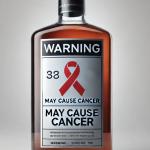Alcohol has once again made headlines, this time with a warning that is likely giving industry executives sleepless nights. Dr. Vivek Murthy, the U.S.
alcohol
It is nothing short of hilarious that people who drink excessively, to the point where they experience a hangover the next day, are overly concerned about their health.
December is traditionally the biggest party month of the year, with Christmas and Hanukkah celebrations capped by New Year’s Eve.
Federal regulators are deeply concerned about flavored tobacco, especially vaping products.
Health scares seem to lurk around every corner these days. From "toxic" pesticides to "ultra-processed" foods and BPA, the list of things that can supposedly kill us is endless. How do you spot genuine threats amid all the clickbait?
Are you still afraid of COVID-19? Perhaps it's the prospect of an escalating conflict in Ukraine that has you worried. Forget all that. The real threat to your health might be the IPA or glass of wine you had with dinner last night.
The latest 2020-2025 US Dietary Guidelines, which are updated every five years, landed over the holidays with the usual flurry of claims that vested interests have meddled with them.
Over 15 years, from 2000 to 2015, there were 612,030 motor vehicle fatalities, 37% involved one or more drivers with a positive BAC. While the majority, 85%, involved a legally impaired level, roughly 34,000 deaths involved lower amounts.
It’s early, but The Atlantic is already in the running for worst science article of the year.
Here is a question. When you plot alcohol use against the risk of cancer, is the resulting curve J-shaped, suggesting that at low levels of consumption, alcohol may be protective?












